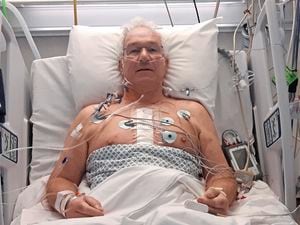Unlawful killing case: Admissions to mental health ward ‘disjointed’
THE failure of two nurses to carry out regular observations on Lauren Ellis in Crevichon Ward was not the only factor in her death, the Royal Court heard yesterday.

Miss Ellis, 22, who had been diagnosed with emotionally unstable personality disorder, and who had a long history of serious self-harm, died on the ward at The Oberlands Mental Health Centre in the early hours of 12 October 2017.
Nurses Rory McDermott, 32, and Naomi Prestidge, 31, deny the joint unlawful killing of Miss Ellis through gross negligence.
Miss Ellis was found strangled with a binding around her neck. A post-mortem examination found she had died through ligature strangulation.
Defence witness Dr Tracey McClean, who works for the Committee for Education, Sport & Culture, was asked to carry out a root cause analysis of the incident in order to address any significant failings in the system.
She told day 11 of the hearing that admissions to the ward were disorganised and disjointed. Information was not shared between staff and no one person was taking the lead. There was a lack of policy for safe and supported observations such as the ones that were meant to be carried out on Miss Ellis every 15 minutes.
She said she wished to balance that by questioning the effectiveness of such observations in the first place as people elsewhere had managed to harm or kill themselves in the gaps between checks.
The increased risk which Miss Ellis had displayed with her behaviour in the build-up to her crisis admission as a voluntary patient the day before had not been adequately explored by doctors or nursing staff.
There were discrepancies as to who had been present at a shift handover and entries on the Trakcare patient record scheme were incomplete and brief. It was difficult to see who was taking the clinical lead and at least three people were involved. Dr McClean said this gave her concern over consistency of care.
For Mr McDermott, Advocate Mark Dunster asked the witness what she thought about people working excessive hours as he said his client had worked 62.75 hours more than he was contracted to in September.
Dr McClean said this gave her concern and could cause burnout. Ultimately, people became ill, lost their compassion of care, made mistakes, or left the profession.
Prosecuting Advocate Chris Dunford said Mr McDermott had not worked extra hours in October. Dr Geraldine O’Sullivan, who reviewed the root cause analysis, had found that overall there was a good mental health service in the Bailiwick. He asked Dr McClean if she agreed and she said she did.
Six of the 15-minute checks were missed and there was one hour and 42 minutes between the last one and the discovery of what had happened to Miss Ellis.
Advocate Dunford asked the witness if she had known that Miss Prestidge had been looking up things such as the Hard Rock Cafe in Tenerife on her mobile phone during that time. When told of the drugs that Miss Ellis was being prescribed, Mr McDermott messaged his colleague saying Miss Ellis ‘needed a line of Ket’ – Ketamine – a horse tranquilliser used by some to get high.
‘What do you think of that comment?’ asked Advocate Dunford.
Dr McClean said it did not reflect well on the profession and said she would have expected more of a nurse. When put to her by Advocate Dunford, she accepted it was a terrible taint on the profession.
She said she had been surprised at the use of mobile phones, as there was a policy that staff were not to use them while on duty.
Advocate Dunford said that in Dr McClean’s report she had not mentioned two nurses who, while supposed to be carrying out checks, were using mobiles phones in an office while Lauren Ellis was killing herself in a nearby room.
Dr McClean said she was not able to interview either of the defendants when compiling her report. Advocate Dunford said there was little mention too of how both had falsified records when it came to checks that had not been carried out.
Dr McClean said this sort of thing would be dealt with under a hospital disciplinary system.





